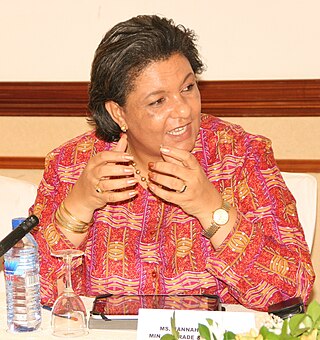Related Research Articles

The Violence Against Women Act of 1994 (VAWA) is a United States federal law signed by President Bill Clinton on September 13, 1994. The Act provided $1.6 billion toward investigation and prosecution of violent crimes against women, imposed automatic and mandatory restitution on those convicted, and allowed civil redress when prosecutors chose to not prosecute cases. The Act also established the Office on Violence Against Women within the U.S. Department of Justice.

A women's shelter, also known as a women's refuge and battered women's shelter, is a place of temporary protection and support for women escaping domestic violence and intimate partner violence of all forms. The term is also frequently used to describe a location for the same purpose that is open to people of all genders at risk.
Domestic violence is a severe issue in Russia. According to Human Rights Watch, citing RIA Novosti, as many as 36,000 women and 26,000 children faced daily abuse at home in 2013. According to official MVD data, in 2015 around 1060 people died of domestic violence in Russia. Of them, 756 were men and 304 women. According to an independent study of 2,200 women in fifty cities and towns in Russia, 70% have experienced at least one form of gender-based violence in the home—physical, psychological, economic, or sexual.

The National Network to End Domestic Violence(NNEDV) is a 501(c)(3) not-for-profit organization founded in 1990, based in the District of Columbia. It is a network of state and territorial domestic violence coalitions, representing over 2,000 member organizations nationwide. The National Network to End Domestic Violence works to address the many aspects of domestic violence.

The status of women in Ghana and their roles in Ghanaian society has changed over the past few decades. There has been a slow increase in the political participation of Ghanaian women throughout history. Women are given equal rights under the Constitution of Ghana, yet disparities in education, employment, and health for women remain prevalent. Additionally, women have much less access to resources than men in Ghana do. Ghanaian women in rural and urban areas face slightly different challenges. Throughout Ghana, female-headed households are increasing.
Domestic violence in Brazil involves any type of violence or abuse by intimate partners or family members against one another. The majority of domestic violence cases in Brazil are performed by the man against their female partners. In 2015, the government released a study that showed that every seven minutes a woman was a victim of domestic violence in Brazil, over 70% of the Brazilian female population will suffer some kind of violence throughout their lifetime and 1 in every 4 women reports being a victim of psychological or physical violence. In 2017, Brazil had an estimate of 606 cases of violence and 164 cases of rape per day, over 60 thousand cases throughout the year. It is also estimated that only 10% of the cases are registered to the police. Although Brazil acknowledged that domestic violence was a problem in the 1940s, the Government has only acted upon it from 1980s onwards, with the creation of the Women Police Stations and later in 2006, with the publication of the Domestic Violence law.
The most pervasive violations of women's rights in Paraguay involve sexual and domestic abuse. On average one woman is murdered every 10 days. Although Paraguay has taken several measures to deal with this problem, including creating special police units for domestic violence victims, lack of adequate laws, as well as conservative attitudes within a male dominated society hinder progress.

Domestic violence is violence or other abuse that occurs in a domestic setting, such as in a marriage or cohabitation. Domestic violence is often used as a synonym for intimate partner violence, which is committed by one of the people in an intimate relationship against the other person, and can take place in relationships or between former spouses or partners. In its broadest sense, domestic violence also involves violence against children, parents, or the elderly. It can assume multiple forms, including physical, verbal, emotional, economic, religious, reproductive, or sexual abuse. It can range from subtle, coercive forms to marital rape and other violent physical abuse, such as choking, beating, female genital mutilation, and acid throwing that may result in disfigurement or death, and includes the use of technology to harass, control, monitor, stalk or hack. Domestic murder includes stoning, bride burning, honor killing, and dowry death, which sometimes involves non-cohabitating family members. In 2015, the United Kingdom's Home Office widened the definition of domestic violence to include coercive control.
Specialized domestic violence courts are designed to improve victim safety and enhance defendant accountability. They emerged as a problem-solving court in the 1980s and 1990s in response to frustration among victim advocates, judges and attorneys who saw the same litigants cycling through the justice system again and again.
In Australia, domestic violence (DV) is defined by the Family Law Act 1975. Each state and territory also has its own legislation, some of which broadens the scope of that definition, and terminology varies. It has been identified as a major health and welfare issue. Family violence occurs across all ages and demographic groups, but mostly affects women and children, and at particular risk are three groups: Indigenous, young and pregnant women.
Hilda Morales Trujillo is a lawyer in Guatemala who has become internationally known for her work in defending women's rights and as a campaigner for Guatemala's Network for Non-Violence Against Women. In 2004 she shared the Amnesty International Ambassador of Conscience Award with Mary Robinson.

The Ministry of Gender Equality and Family, or formerly the Ministry of Gender Equality, is a cabinet-level division of the government of South Korea. It was created on February 28, 1998 as the Presidential Commission on Women's Affairs. The current ministry was formed on January 29, 2001.

Domestic violence in United States is a form of violence that occurs within a domestic relationship. Although domestic violence often occurs between partners in the context of an intimate relationship, it may also describe other household violence, such as violence against a child, by a child against a parent or violence between siblings in the same household. It is recognized as an important social problem by governmental and non-governmental agencies, and various Violence Against Women Acts have been passed by the US Congress in an attempt to stem this tide.
The following outline is provided as an overview of and topical guide to domestic violence:

The management of domestic violence deals with the treatment of victims of domestic violence and preventing repetitions of such violence. The response to domestic violence in Western countries is typically a combined effort between law enforcement, social services, and health care. The role of each has evolved as domestic violence has been brought more into public view.
Violence against women in Fiji is recognised to be "pervasive, widespread and a serious national issue" in the Pacific Island region. Fiji's rates of violence against women are "among the very highest in the world". The Fiji Women's Crisis Centre reports that 64% of women who have been in intimate relationships have experienced physical or sexual violence from their partner, including 61% who were physically attacked and 34% who were sexually abused.
Domestic violence and abuse in the United Kingdom are a range of abusive behaviours that occur within relationships. Domestic violence or abuse can be physical, psychological, sexual, financial or emotional. In UK laws and legislation, the term "domestic abuse" is commonly used to encompass various forms of domestic violence. Some specific forms of domestic violence and abuse are criminal offences. Victims or those at risk of domestic abuse can also be provided with remedies and protection via civil law.

Domestic violence in South Korea is the mental, physical, verbal or sexual abuses or crimes of violence committed towards a victim in a domestic setting of marital relations and cohabitation. Domestic violence describes violence towards a domestic partner, towards children and between siblings. According to the Domestic Violence Survey of South Korea in 2010, elder abuse was estimated to be 10%, physical abuse accounted for 2.2%, emotional abuse 9%, economic abuse 1.2%, and neglect 2.5%. Marital violence has been the most prevalent form of family violence in South Korea. One out of six couples in South Korea had more than one episode of physical violence from their spouse.

Crime in Ghana is investigated by the Ghana Police Service.

The Domestic Abuse Act 2021 is an Act of Parliament of the United Kingdom. The act included provisions necessary to ratify the Istanbul Convention. Much of the content within the Act is still much debated. The Act is intended to help tackle domestic violence in the United Kingdom, which has been referred to as a "silent epidemic." There have been numerous suggestions to address the Act's protection of victims of domestic violence. The United Kingdom has also received criticism for taking eight years to carry out commitments following the Istanbul Convention.
References
- ↑ "About Dovvsu". 197.253.65.120. Retrieved 2019-05-26.
- ↑ "Be bold to report any form of abuse – DOVVSU". www.ghanaweb.com. Retrieved 2019-05-26.
- ↑ "Domestic Violence and Victim Support Unit (DOVVSU) and Domestic Violence Legislation in Ghana". womensphere. 2008-07-19. Retrieved 2019-05-26.
- ↑ "The law and gender-based violence". Modern Ghana. 2011-02-23. Retrieved 2019-05-26.
- ↑ "About Dovvsu". 197.253.65.120. Retrieved 2019-05-26.
- ↑ Refugees, United Nations High Commissioner for. "Refworld | Ghana: Domestic Violence Victim Support Unit (DOVVISU), formerly the Women and Juvenile Unit (WAJU), established by the Ghanaian police and whether it provides protection to women in Ghana (March 2006)". Refworld. Retrieved 2019-05-26.